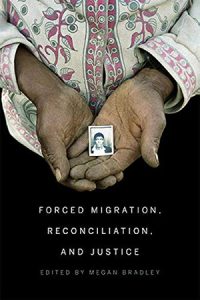Forced Migration, Reconciliation, and Justice

Editor: Megan Bradley
Publisher: McGill-Queen’s University Press
Year of Publication: 2015
Print Length: 448 pages
Genre: Non-Fiction / Law, Political Science, Anthropology, Social Science, Social Work
Area: Bosnia and Herzegovina, Cambodia, Canada, Kenya, Lebanon, Timor-Leste, Turkey/Türkiye
People: Refugees & Forced Migration, Internally Displaced Person (IDP), Diaspora, Vietnamese
Topic: Exile & Exodus, Justice, Reconciliation, Restitution, Transitional Justice, Restorative Justice, Social Justice, Challenges & Opportunities, Future Scenarios, Lived Experience, Peace, Policy & Practice, Refugee Reintegration & Reconstruction, Refugee Repatriation, Refugee Voluntary Returns, Dialogue, Oral History, Testimonies, Theatre, Forgiveness, Psychosocial, Social Cohesion, Religion, Religious Institution, Host Community, Social Work & Services, Social/Aid Workers, Human Rights, Interconnectedness, Land & Property
At the start of 2014, more people were displaced globally by conflict and human rights violations than at any time since the Second World War. Although many of those displaced, from countries such as Syria, Iraq, Colombia, Kenya, and Sudan, have survived grave human rights abuses that demand redress, the links between forced migration, justice, and reconciliation have historically received little attention.
This collection addresses the roles of various actors including governments, UN agencies, NGOs, and displaced persons themselves, raising complex questions about accountability for past injustices and how to support reconciliation in communities shaped by exile. Forced Migration, Reconciliation, and Justice draws on a variety of disciplinary perspectives including political science, law, anthropology, and social work. The chapters range from case studies in countries such as Bosnia, Cambodia, Lebanon, Turkey, East Timor, Kenya, and Canada, to macro-level analyses of trends, interconnections, and theoretical dilemmas. Furthermore, the authors explore the contribution of trials and truth commissions, as well as the role of religious practices, oral history, theatre, and social interactions in addressing justice and reconciliation issues in affected communities. In doing so, they provide fresh insight into emerging debates at the centre of forced migration and transitional justice.
Exploring critical issues in political science and development studies, this provocative collaboration unites leading researchers, policymakers, human rights advocates, and aid workers to examine the theoretical and practical relationships between displacement, transitional justice, and reconciliation.
Table of Contents
Acknowledgments
Abbreviations
Foreword: Advancing Justice and Reconciliation in Communities Affected by Displacement — Chaloka Beyani
Introduction: Forced Migration, Transitional Justice, and Reconciliation: Links, Limits, and Possibilities — Megan Bradley
PART ONE. DISPLACEMENT, JUSTICE AND RECONCILIATION: CONCEPTUAL AND POLICY LINKS
1. Refugees, Peacebuilding, and Reconciliation: Lessons from Policy, Practice and Research — James Milner
2. Reconciliation and Reintegration: Transitional Justice and the Resolution of Displacement — Roger Duthie
3. Property Rights and Public Interests: Restitution, Transitional Justice, and Post-conflict Reconciliation — Anneke Smit
PART TWO. RECONCILIATION AND EXILE: DIASPORA AND HOST COMMUNITY EXPERIENCES
4. Negotiating Place: Interpersonal Reconciliation and Emplacement — Mateja Celestina
5. The Forgotten Ones: Vietnamese Catholics in Cambodia and Their Quest for Reconciliation — Thien-Huong T. Ninh
6. A Modest Reconciliation: Coming to Terms with Conflicted Stories through Oral History, Dialogue, and Playback Theatre in Montreal’s Rwandan Canadian Community — Lisa Ndejuru
PART THREE. JUSTICE, RECONCILIATION, AND RESOLVING DISPLACEMENT: IN THEORY AND IN PRACTICE
7. Truth-Telling, Internal Displacement, and the Peace Process in Colombia — Roberto Vidal López
8. Return and Reintegration in Divided Societies: The Case of Bosnia and Herzegovina — Huma Haider
9. Resolving Internal Displacement in Turkey: The Need for Reconciliation — Ayşe Betül Çelik
10. Can Reconciliation Mechanisms in Post-conflict Settings Further Divide Communities? The Case of Lebanon — Nancy Maroun
11. The Timor-Leste Commission for Reception, Truth, and Reconciliation and the 2006 Displacement Crisis in Timor-Leste: Reflections on Truth-Telling, Dialogue, and Durable Solutions — Luiz Vieira
12. The Challenge of Prosecuting Forced Displacement at the International Criminal Court: The Case of Kenya — Paige Morrow and Jennifer Winstanley
13. The Palestinian Refugee Issue: Intangible Needs and Moral Acknowledgment — Michael Molloy, John Bell, Nicole Waintraub, and Ian B. Anderson
14. Refugee Entitlement and the Passing of Time: Waldron’s Supersession Thesis and the Palestinian Refugee Case — Mick Dumper
Conclusion: Implications for Research, Policy, and Practice at the Intersection of Forced Migration, Transitional Justice, and Reconciliation — Megan Bradley
References
Contributors
Index

Megan Bradley is Associate Professor and William Dawson Scholar in Political Science and International Development Studies at McGill. She began serving as Director of the Institute for the Study of International Development (ISID) in June 2023. Her research and teaching focus on refugees and forced migration, human rights, disasters and humanitarianism. She is the author of books including Refugee Repatriation: Justice, Responsibility and Redress (Cambridge University Press, 2013) and The International Organization for Migration: Commitments, Challenges, Complexities (Routledge, 2020), and co-editor of Refugees’ Roles in Resolving Displacement and Building Peace: Beyond Beneficiaries (Georgetown University Press, 2019) and IOM Unbound? Obligations and Accountability of the International Organization for Migration in an Era of Expansion (Cambridge University Press, 2023). She serves as co-editor of the Journal of Refugee Studies. She was a Fellow with the Brookings Institution Project on Internal Displacement, and has worked with UNHCR, the International Development Research Centre (IDRC), and as the Cadieux-Léger Fellow at Global Affairs Canada.
Source: https://www.mcgill.ca/isid/people-0
More from Megan Bradley in this library, click here.
